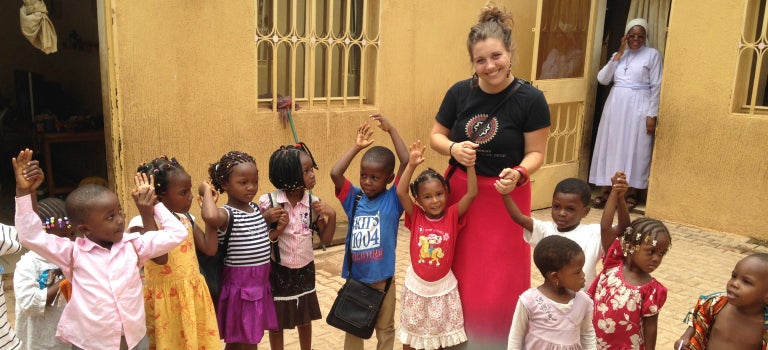Four Students to Present “Education & Social Justice Project” Findings

Elizabeth “Hopey” Fink was one of four Georgetown College students who served as a 2014 Education & Social Justice summer research fellow. Photo courtesy Hopey Fink.
January 9, 2015—On January 14, the 2014 Education & Social Justice Project summer research fellows—all of whom are Georgetown College students—will present their findings and experiences at Georgetown’s Berkley Center for Religion, Peace, and World Affairs.
Founded in 2009, the Education & Social Justice Project is a collaborative effort between the Berkley Center and Georgetown’s Center for Social Justice Research, Teaching, and Service. The centers created the project to engage students and build knowledge about the connections between global challenges of poverty and education.
Each year, the project provides several students with summer research fellowships. The fellows travel abroad for in-depth examinations of innovative initiatives, with a focus on the work of Jesuit secondary and post-secondary institutions. Under faculty supervision, fellows conduct interviews, analyze best practices, and share their reports with a wider global audience.
“The Education & Social Justice Project is an incredible opportunity for Georgetown students to conduct in-depth examinations of innovative initiatives at Jesuit institutions. ESJ students expand their research and writing skills learned at the Hilltop, applying them in their own global classroom,” said Professor Michael Kessler, managing director of the Berkley Center.
This past summer, the project awarded fellowships to four Georgetown College students. Each student spent three weeks with institutions engaged in efforts to promote social justice through education in Bangladesh, Brazil, Burkina Faso, and Nicaragua.
“All of the students are incredibly passionate, [and] their stories from the field were amazing,” said Andria Wisler, director of the Center for Social Justice.
Kendra Layton (C’15), hosted by the nonprofit Caritas Bangladesh, traveled to Dhaka to research how the organization supports the country’s hardest-to-reach students, including those who are indigenous, live in slums, and have disabilities. “As someone who speaks fluent Spanish and has traveled a lot in Latin America, it was both exciting and challenging to explore a completely new region of the world,” Layton explained. “It was inspiring to see how faith actors are working together to bring about social change.”
In Brazil, Adam Barton (C’16) partnered with Pastoral da Criança to examine its efforts to build community solidarity through maternal and early childhood health education. “It was truly the most rewarding and engaging experience of my academic life,” Barton said.
“I was deeply humbled by the passion and commitment of the incredible volunteers that I was fortunate enough to interview. Pastoral has become the global model for community health education practices, so the fellowship put me at the forefront of international community heath development efforts,” Barton explained. “I interviewed participants who have dedicated their lives to this beautiful mission of ‘life in abundance’ for all and have served as international trail blazers in the fight against infant mortality.”
Elizabeth “Hopey” Fink (C’15) analyzed the role of Jesuit values in supplementary education at C.E.R.C.L.E., a Jesuit-run study center in Ouagadougou, Burkina Faso. “The fellowship reaffirmed my interest in human rights, interfaith dynamics, and West African education, and it allowed me to grow in my French speaking skills, my self-confidence, and my global awareness,” Fink said. “But perhaps the most poignant takeaways from this experience were the genuine friendships I was able to form in those three weeks through the laughter around the dinner table at the Jesuit residence where I was staying and the deep conversations I had with students my age at the study center where my research was based.”
In Managua, Nicaragua, Gianna Maita (C’15), explored student engagement within the context of Nicaraguan history, and the current political atmosphere in the university’s community, through service-learning, research, and other programs. Maita was hosted by the Central American University (Universidad Centroamericana).
“As my fluency in Spanish improved during my time in Nicaragua, it was easier for me to have conversations with interviewees about politics. They were comfortable discussing how Nicaraguan politics currently influence education, even in negative ways,” Maita said. “As the interviews progressed . . . some of the interviewees, as well as people I met outside of the interview setting, were eager to express their knowledge and opinions of the political history of American-Nicaraguan relations. They were polite but unapologetically critical. Thanks to those discussions, I was able to contextualize my presence as an American in Nicaragua and learn much more about a dark part of our history that is not well-detailed in many of our textbooks.”
The fellows have been working on their reports over the last several months. In October 2014, Layton presented her finding at a Homecoming Showcase of Social Justice Research. Next week, all four students will present as a group and answer questions from students interested in the 2015 project.
Event details:
January 14, 2015
7:00 p.m. – 8:30 p.m.
Berkley Center, Third Floor Conference Room
3307 M St NW #200, Washington, DC 20007
An RSVP is required.
Related information
Applications for the 2015 Education and Social Justice International Summer Research Fellowships are currently being accepted. The final deadline is January 19 at 5:00 p.m.
All Georgetown first-years, sophomores, and juniors are eligible to apply. Fellows spend three weeks abroad doing research and conducting interviews, and the fellowships include travel, lodging, meals, and a $1,500 stipend.
For more information, visit the Berkley Center’s website. Questions can be directed to Erin Shevlin.